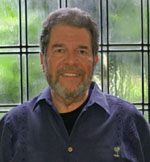Jim Mulvaney became a Counselor Supervisor at Kara after initially volunteering as a grief counselor. Since he joined Kara’s staff in the fall of 2004, Jim has held the positions of Director of Adult Services, Director of Programs, and Director of Special Services. Jim has experience training volunteers and professionals, giving public talks, coordinating Kara’s services for caregivers and end-of-life clients and developing volunteer training modules. He has also served Kara clients as an individual counselor and group facilitator.
Katie: Could you start by telling us a little bit about your background, position and title at Kara?
Jim: I was working in the high tech industry prior to coming to Kara. I had a degree in engineering and was running a web development business up until 2005. What made the shift for me was the fact that, in no anticipation of any problem, my wife suddenly died in January 2001. At that point, I became a client at Kara and met for an hour every week for almost a year with a counselor.
I was then invited to participate in training to become a volunteer counselor. My career was winding down in web development and I didn’t have any plan for what other work I would do, so when the invitation came up, it was an obvious choice. It was an opportunity to help others with grief and continue my own ongoing healing. In 2004, I was invited to be the director of adult services. I accepted that and started my employment at Kara. My current position is in training and education. We go out and provide community education events for caregivers and those working in the area of grief.
Katie: Can you explain the difference between supporting those who are experiencing grief at the end-of-life vs. the typical concept of grief following a death?
Jim: If we’re talking about end-of-life clients, there are three kinds we serve. There might be a person who’s anticipating their own death in a terminal illness sort of situation, there are those anticipating the death of another and then there are the caregivers of the dying. With bereavement and grieving after someone’s passed away, the uncertainty factor is no longer there. With the end-of-life situation, there are a lot of uncertainties about the process – when it will happen, what will happen, what to do after – and naturally we are uncomfortable when we don’t know stuff. Our job is to support those going through it. For family and friend caregivers providing support for those dying, we provide information about self-care. Someone in the family may have the attitude that they are the best to do the job and have to do everything. They have no limits when it comes to caring for that person, and while that’s understandable, it can’t continue indefinitely because the caregiver will definitely burn out; that’s not good for them or the person receiving care. We instill a sense of balance for the amount of effort one must put into caregiving and self-care. A lot of our support is to help bring more of a balance into
the caregiver’s life. For example, setting aside respite time and asking for help can be surprisingly difficult. There is often very little encouragement for caregivers to also take care of themselves, and we try to help them handle the balance when they don’t know what to expect.
Katie: I’d really like to know more about Kara’s different approaches for helping someone through the grieving process. Can you explain the difference between one-on-one and group counseling?
Jim: Most of Kara’s services are peer support. The peer counselor is not necessarily a therapist or psychotherapist, but they have personal experience with loss and death and have been trained and supervised by Kara before meeting with peer clients. We also have a therapy program, and that’s for clients who have complicated factors or a situation that goes beyond peer counseling, so we refer them to our therapy program. The only form of therapy we provide is on an individual level. With peer counseling, we provide one-on-one, but we also provide group support, which is supervised by two peer counselors.
In general, I would say the peer support is based on an accompanying model in the sense that the counselor is not there to fix, make anything better or give advice. Their key role is to be compassionately present with the client so they can share anything they want to talk about. If you are a client, you can expect to be deeply listened to by somebody who actually understands your situation. This is where the support comes from. When someone’s grieving, they might think am I going crazy? or should I be worried about this? Counselors can help normalize these feelings, and most often the concerns are a natural part of the grieving process. Someone who’s been there before can help normalize what you’re experiencing, and that can help eliminate a lot of stress.
“If you are a client, you can expect to be deeply listened to by somebody who actually understands your situation.”
Katie: On average, how long does a client meet with a counselor?
Jim: Once we match a counselor with a client, they meet once a week for an hour and they determine together when the client might be ready to close the exchange. There is no limit on the time a client needs as they go through the initial, intense period of grief and then begin to move on with the new normal in their life. All peer groups meet for an hour and a half twice a month. With the group, they are hearing the experiences of others. For some, this can be very helpful, but for others it’s too difficult to hear about other’s pain in addition to feeling their own. In that case, they can get a counselor to work with one-on-one.
Katie: You mentioned how you address spiritual, emotional & mental health — would you elaborate on these as they relate to end-of-life grief and how you approach them?
Jim: Again, because our counselors are not fixing or making it better, we’re not guiding the clients in any direction at all. With grief there can be a lot of regrets. For myself, I regretted not appreciating my wife more fully while she was alive and not giving her enough loving attention. These regrets will come up because we can’t appreciate them as much when they’re around all and only fully realize our appreciation for them after they’re gone. This is part of the human condition and there is nothing you can do about regret except move forward and integrate it into your life in a positive way. What I found myself doing was telling people in my life more regularly what they mean to me. I now just say these things when they crop up in my own life. It isn’t a project, it was just when I notice those loving feelings coming up, I’ll openly express it.
Katie: Finally, is there anything you find important to tell our readers?
Jim: Kara’s mission is to provide grief support to all ages. Our clients are compassionately supported through their grief journey with renewed hope and meaning. This can happen over months or over a year. And again, it is the client leading the journey and looking for companionship on the journey. They can get help normalizing their lives and get a lay of the land as they move through the grieving process.
Katie: Thanks, Jim!
Jim: Any time.
For more information:
- Handout: Journey Through Grief
- Handout: How to Help Someone Who is Suffering From Loss
- Handout: Keys to Good Listening

 What is Kara Grief Support? An Interview with Jim Mulvaney
What is Kara Grief Support? An Interview with Jim Mulvaney




 Our Annual Seven Holiday Gifts for Someone Who Is Grieving, 2024 Edition
Our Annual Seven Holiday Gifts for Someone Who Is Grieving, 2024 Edition
 “Making Mobiles” by Karolina Merska
“Making Mobiles” by Karolina Merska
 “Hands Up to the Sky” by Michael Franti & Spearhead
“Hands Up to the Sky” by Michael Franti & Spearhead














